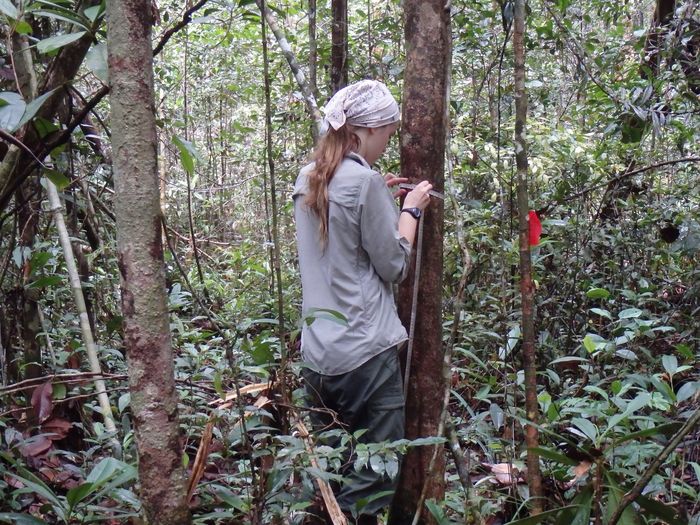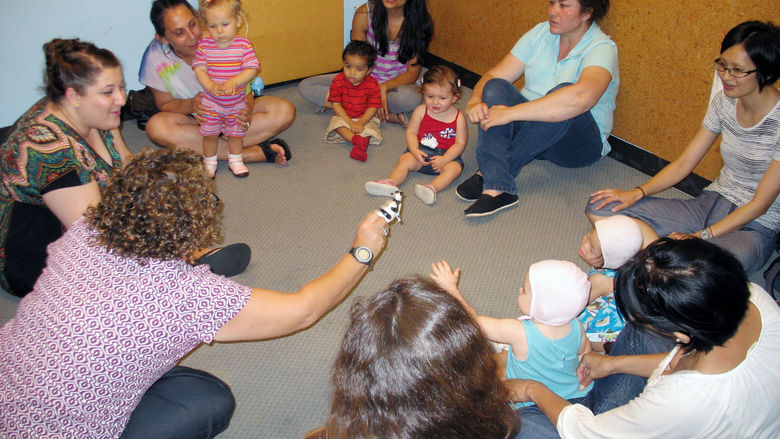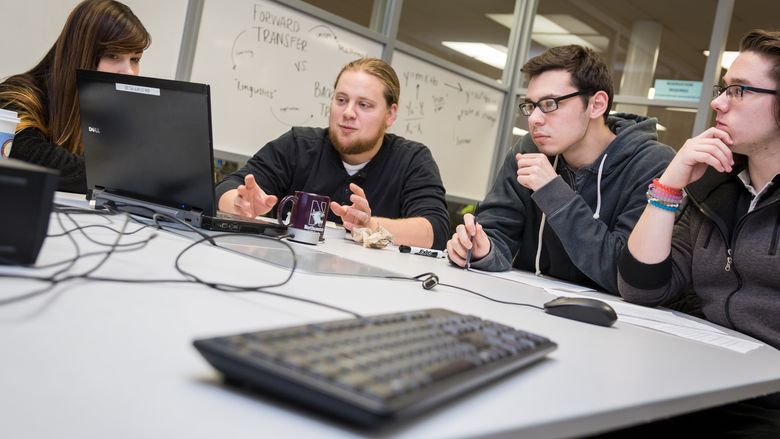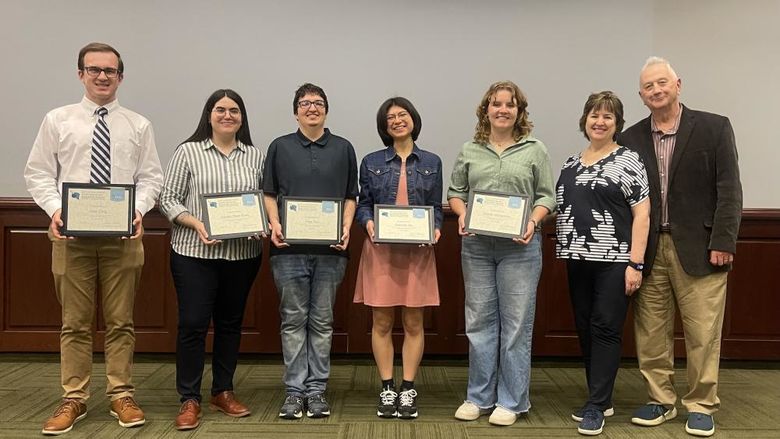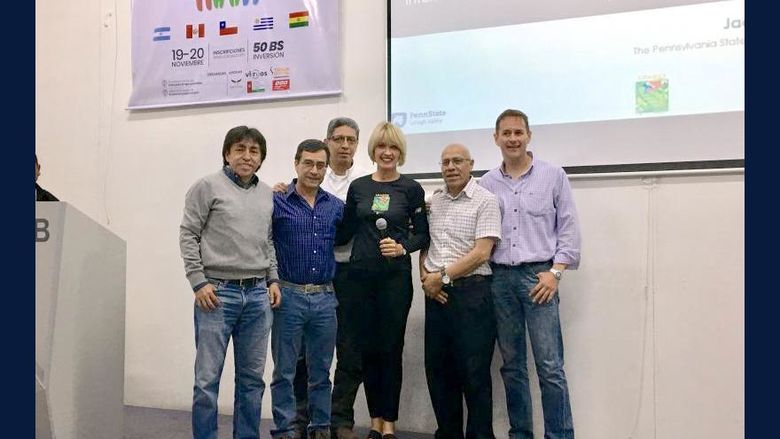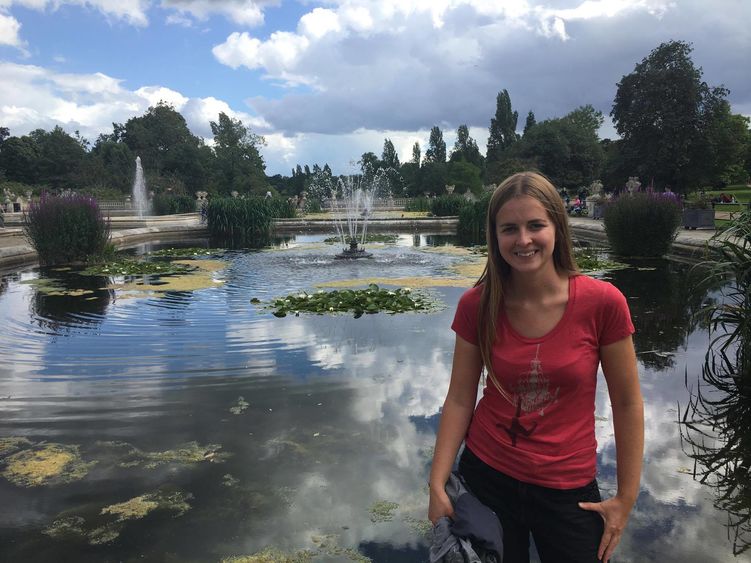
Penn State graduate Megan Draper at Kensington Gardens in London, England.
While earning her bachelor's degree in psychology from the Brandywine campus, Penn State graduate Megan Draper completed a unique research project that allowed her to explore her passion for primates and pursue a career in her dream field.
In September 2013, the Cooper Honors Scholar traveled to Borneo, in southeast Asia, for six weeks with the Orangutan Tropical Peatland Project (OuTrop), which works to protect, conserve and restore several of the most significant areas of tropical rainforest in Borneo. One of OuTrop's main goals is to safeguard the wild population of primates in the region, such as the orangutans, red langurs and Bornean gibbons.
During her stay at OuTrop's remote rainforest basecamp, Draper assisted scientists with collecting data about known primate feeding and sleeping trees, and she was even able to participate in early-morning treks through the forest called “primate behavior follows.” She also researched other animals and insects of the rainforest such as butterflies and wild cats in the region.
The unique opportunity was handcrafted for Draper as part of her honors research project. She worked closely with Director of Academic Affairs Cynthia Lightfoot and Associate Professor of Psychology Pauline Guerin to tailor the project to fit into her curriculum.
Today, Draper is earning her master’s of research degree in primate biology, behavior and conservation from the University of Roehampton in London, England, and credits her honors research project for helping her pursue her career goals.
“My research experience at Penn State Brandywine gave me a realistic expectation of what conducting independent research entails,” Draper said. “Dr. Lightfoot was an outstanding mentor during my time at Brandywine. My experience in Borneo would not have been possible without her.”
As a student at the University of Roehampton, Draper is currently working on research that looks at parent-offspring interactions (with a particular emphasis on male-offspring interactions) of gibbons, a small ape native to southern and southeast Asia.
“Gibbons are the only apes where social monogamy is a common social system in the wild,” she said. “Despite living in small family groups, gibbon males appear to contribute little direct parental care. However, there is little research on male-offspring interactions in gibbons and more research is needed to determine what parental role, if any, the males play.”
To collect data, Draper traveled to the United States and lived on-site at the Gibbon Conservation Center in Santa Clarita, California, for three months. She spent six hours a day, five days a week observing five separate gibbon families for a total of 20 individual gibbons. She said that all members of the family unit (adult males, adult females and offspring) were used as focal animals in her observation. She then traveled back to London to analyze the data and write her thesis, which she completed this month.
“Sadly, most gibbon species are endangered or critically endangered, primarily due to the destruction of their forest habitat,” she said. “This past year was particularly devastating for wildlife and local communities in southeast Asia due to fire and smoke caused by the burning of rainforests for industrial agriculture purposes such as oil palm plantations.”
So where did Draper’s interest in primates begin?
She said that after graduating from high school she wasn’t sure what type of career to pursue and decided to take a year off to decide. During that time, Draper traveled the world and explored possible career paths.
During a month-long trip to South Africa, she worked as a volunteer for the Centre for Animal Rehabilitation and Education, which works to rescue, rehabilitate, release and protect wild baboons. Draper acted as a caretaker for the orphaned baby baboons, and fell in love with the animals.
Lightfoot said that she is thrilled to see Draper using the research skills she developed during her experience in Borneo and noted the influence undergraduate research has on career outcomes.
“Megan came to Brandywine with a keen interest in primate behavior and ecology, and we were able to help her construct a program of study that allowed her to pursue her interests,” Lightfoot said. “Engaging in research is a wonderful way to develop and explore career choices and goals. Whether in laboratories or field settings, research provides students with opportunities to collaborate with professionals in the field, as well as faculty and other students.”
“Brandywine undoubtedly shaped my career path,” Draper said. “I liked that the campus was small and student-focused while still being a part of the greater Penn State community. My classes and the personalized education further refined my goals and helped me attain them.”
